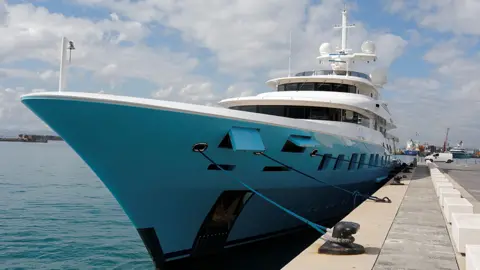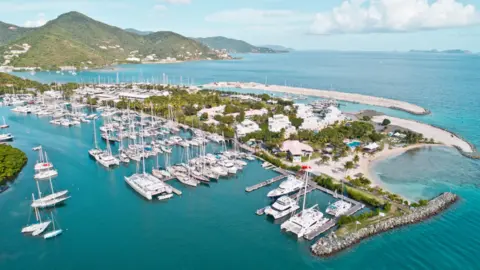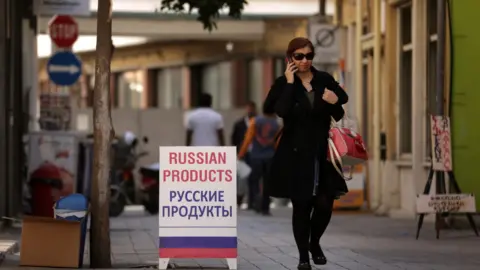Russian oligarchs: Where do they hide their 'dark money'?
 Alamy
AlamyFor decades, Russian oligarchs have moved billions of dollars of ill-gotten money abroad - and have made it extremely hard to trace.
Since Russia's invasion of Ukraine, countries around the world have been using sanctions and new laws to try find this "dark money", hoping to damage the oligarchs close to President Putin.
How much Russian 'dark money' is there around the world?
US think tank the Atlantic Council says that Russians have about $1tn (£750bn) of what it calls "dark money" hidden abroad.
Its 2020 report estimated that one-quarter of this amount is controlled by Russian President Vladimir Putin and his close associates - wealthy Russians known as "oligarchs".
"This money can be exploited and steered by the Kremlin for espionage, terrorism, industrial espionage, bribery, political manipulation, disinformation, and many other nefarious purposes," the report said.
How was the dark money made?
Another US think tank, the National Endowment for Democracy, says Putin has encouraged close associates "to steal from the state budget, extort money from private businesses, and even orchestrate the outright seizure of profitable enterprises".
It says that in this way, they have built up personal fortunes running into the tens of billions.
Russian opposition leaders Boris Nemtsov and Vladimir Milov have claimed that between 2004 and 2007, $60bn was transferred from oil giant Gazprom's funds to Putin's cronies.
The Pandora Papers, released by the International Consortium of Investigative Journalists, note that people close to Putin have become very wealthy - and could be helping him move his own wealth around.
Where is the money held?
Historically, much of this money has gone to Cyprus - enticed by favourable taxes. To some, the island became known as "Moscow on the Med".
According to the Atlantic Council, $36bn (£27bn) of Russian money went there in 2013 alone. Much of it arrived via shell companies, which are used to obscure the true owners.
In 2013, the International Monetary Fund persuaded Cyprus to close tens of thousands of bank accounts held by shell companies.
 Getty Images
Getty ImagesBritish Overseas Territories such as the British Virgin Islands and the Cayman Islands, are also favourite destinations.
A report by Global Witness said that in 2018, Russian oligarchs had an estimated $45.5bn (£34bn) in these tax havens.
Some of this money finds it way to financial capitals such as New York and London, where it can be invested and reap returns.
The anti-corruption organisation Transparency International claims that at least $2bn (£1.5bn) of UK property is owned by Russians accused of financial crime, or with links to the Kremlin.
The breadth of Russian money laundering was further exposed in a 2014 report by the Organized Crime and Corruption Reporting Project into the "Russian Laundromat". It said that between in 2011 and 2014, 19 Russian banks laundered $20.8bn (£15.6bn) to 5,140 companies in 96 countries.
How is the money hidden?
The usual way that Russian oligarchs hide their "dark money" abroad is through shell companies.
"These oligarchs hire the best lawyers, auditors, bankers, and lobbyists in the world to develop legal means to conceal and launder their funds," says the Atlantic Council.
"A serious oligarch has layers of anonymous shell companies in a score of offshore jurisdictions, and his funds move at lightning speed between them."
In 2016, the International Consortium of Investigative Journalists published the Panama Papers, which showed one company alone had set up 2,071 shell companies for wealthy Russians.
What steps are being taken to dig out oligarchs' money?
Following the invasion of Ukraine, countries have announced a series of measures to track down Russian money.
The US is setting up a new "KleptoCapture" task force to crack down on the the finances of Russia's oligarchs.
It will be run by the Justice Department and is meant to seize assets obtained through unlawful conduct.
The UK government has taken steps to increase its use of Unexplained Wealth Orders (UWOs), which oblige people to prove where they got the cash to buy assets in the UK.
 AFP via Getty Images
AFP via Getty ImagesAccount Freezing Orders (AFOs) allow courts to freeze funds in a bank or building society if they suspect the money is linked to criminal activity.
And the government has approved the Economic Crime Act, with a register of beneficial ownership for property owned by overseas entities.
The UK also has scrapped its "golden visa scheme", which gave residency rights to wealthy foreigners if they invested large amounts of money in the country.
Malta, a favourite haven for Russian money, has also scrapped its "golden passport" scheme which allowed oligarchs to buy citizenship. Cyprus and Bulgaria scrapped their golden passport schemes in 2020.
